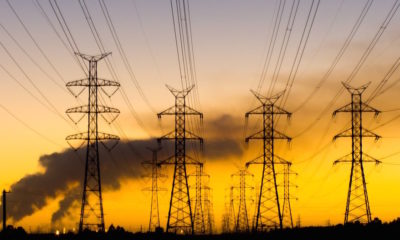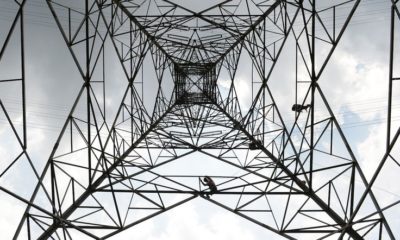- Power Sector Remains Challenged, Says Osinbajo
Vice President Yemi Osinbajo Wednesday in Abuja said despite years of its privatisation, the power sector has remained handicapped in the delivery of required services to various homes and businesses.
The vice-president, who made these remarks in Eagle Square while delivering a presidential speech in commemoration of the Workers’ Day, however, promised that the current administration would alter the status quo.
According to him, the federal government would spend energy to reposition and re-engineer the sector with a view to enabling it deliver effective services to end users.
The vice-president also remarked that the federal government would reciprocate the re-election of this administration by Nigerians at the last general election by focusing on critical issues aimed at improving the living standards of the people.
He said this would be done by building infrastructure, roads, rail, hydroelectric power and simultaneously reforming key economic sectors of the country with a view to placing Nigeria on the path of economic growth and prosperity that is sustainable.
The vice-president further said in line with the theme of this year’s workers’ day, “Another 100 Years of Struggle for Jobs, Dignity and Social Justice in Nigeria,” the federal government would pay attention to the welfare of Nigerians especially those at the lowest wrung of the ladder in its economic planning and budgeting.
Furthermore, Osinbajo who emphasised federal government’s commitment to the daily wellbeing of its citizens including their social justice and dignity, pledged that the recently signed minimum wage bill would be thorough implemented by the federal government.
He said: “At the just concluded general elections, Nigerians and indeed Nigerian Workers gave our administration another mandate to govern them. We shall reciprocate this electoral gesture by focusing on the critical issues that will advance speedily and improve the quality of lives and livelihoods of Nigerians. These include the building of infrastructure, roads, and rail, hydroelectric power, and also reforming key driving sectors of the national economy in order to put the country on a sustainable path of economic growth and prosperity.
“We are especially committed to changing the narrative in the power sector. Today that sector, after it was privatized, still remains challenged in delivering power to many Nigerian homes and businesses. We must work as a matter of national importance and we are committed to doing so, to rework and re-engineer the sector for much more effective performance.
“So, for this administration, the theme: “Another 100 Years of Struggle for Jobs, Dignity and Social Justice in Nigeria’’ is not merely a headline for this May Day celebration, we truly believe that the Nigerian citizen, especially those at the bottom of the pyramid, must be the central focus of all economic planning and budgeting.
“The welfare and well-being of all these Nigerians who work everyday and render honest services every day is the true benchmark of our commitment as government and a people to social justice and dignity of all Nigerians.
“We will continue to commit ourselves to the cause of improving the lot of every working Nigerian and providing for those who cannot work. In this regard, the new National Minimum Wage, which Mr. President signed into law a few days ago, shall be fully implemented by the current administration.”
The vice-president who thanked the leaders of the organised labour for the understanding they showed during the tortuous negotiation process for the new minimum wage, also solicited their constant support and cooperation for the government.
He assured the workers that the federal government would continue to provide the enabling environment for productivity, industrial harmony, protection of their fundamental rights, urging them to rarely employ the tools of industrial action as weapons for resolving disputes.
“Let me once again express our deep appreciation to the leadership of the Nigerian Workers for the understanding showed during and after the negotiations of the new National Minimum Wage. We shall continue to provide the enabling environment for higher productivity, industrial peace and harmony, as well as a congenial atmosphere for effective collective bargaining amongst trade unions and employers, while also protecting fundamental rights and other lawful rights of the Nigerian people and especially people who are at work.
“Workers shall be called upon to play greater roles in supporting the government to attain all these goals I have stated. Industrial peace is central to economic stability. Every industrial disruption costs the national economy very dearly in money and man-hours that are lost.
“It is for this reason that I urge all actors in the industrial relations system to be more circumspect, patriotic and ethical in the use of industrial actions as tools for resolving workplace crisis and addressing grievances. Industrial actions, because of the huge economic and social costs, must be the last, not the first option for resolving disputes,” he added.
The vice-president recalled that when the current administration came on board in 2015, it was confronted with acute economic challenges.
However, he said despite such challenges, it was determined not to retrench any worker, a principle he said has been sustained till date.
According to him, instead of falling into the temptation of retrenching workers, it rather proceeded to provide bail-out funds for states to enable them pay workers’ salaries, pointing out further that the federal government paid outstanding pensions to former workers as well as various arrears and allowances that civil servants were owed.
The vice-president then proceeded to reel out what he considered as the achievements of the federal government particularly its social investment programmes which he described as the largest in Africa.
“On assumption of office in 2015, in spite of the daunting economic challenges, which confronted us at the time, we ensured that no worker was retrenched across the country. We further kept faith with this commitment by providing bailout funds for States unable to pay salaries and other benefits in order to pay accumulated arrears. We also released the Paris Club refunds owed since 2005 to make sure workers were not owed anything.
“We also ensured the payment of outstanding benefits of retrenched Nigerian Airways workers owed for decades. We also ensured the Pension Transitional Arrangement Directorate (PTAD), also paid arrears owed to parastatals and civil service pensioners covering 101,393 civil service pensioners on all grade levels and 76,310 parastatals pensioners across 186 agencies.
“This is in addition to arrears paid to pensioners in the police and customs service in 2016 and 2018. Our administration also settled the issue of benefits of Nigerian Armed Forces and paramilitary personnel who were dismissed and later pardoned for participating on the side of the secession in the course of the Civil War from 1967-1970. All of these veterans have now been paid their benefits.
“Our social investment programmes is the largest of its kind in Africa, and it is directed at ensuring that we are able to provide opportunities in both the formal and informal sectors of the economy,” the vice-president submitted.

 Billionaire Watch3 weeks ago
Billionaire Watch3 weeks ago
 Startups4 weeks ago
Startups4 weeks ago
 News4 weeks ago
News4 weeks ago
 News4 weeks ago
News4 weeks ago
 Bitcoin4 weeks ago
Bitcoin4 weeks ago
 Naira4 weeks ago
Naira4 weeks ago
 Forex3 weeks ago
Forex3 weeks ago
 Treasury Bills4 weeks ago
Treasury Bills4 weeks ago

























